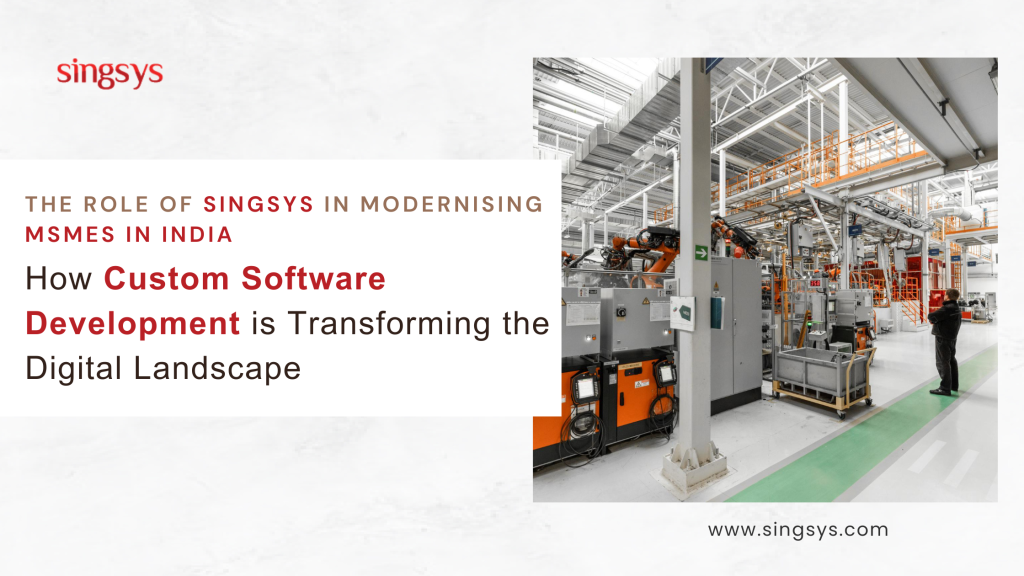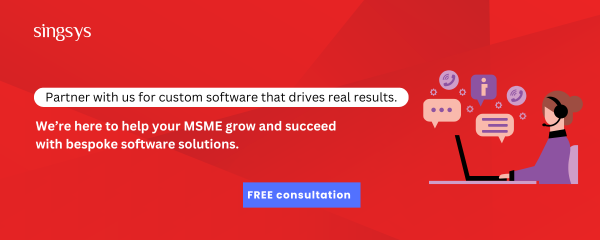Shift-Left vs Shift-Right Testing: What Actually Works in Production
Software quality is not something that testers have to think about at the end of development anymore. It is something that everyone has to think about all the time when […]

India’s Micro, Small, and Medium Enterprises (MSMEs) are the backbone of the country’s economy. With over 63 million MSMEs across various sectors, these enterprises play a crucial role in job creation, innovation, and economic growth. However, in an era where digital transformation is no longer a luxury but a necessity, MSMEs in India face the challenge of staying relevant in a rapidly evolving market.
Singsys is one of the companies that play a crucial role in this process by offering custom software development solutions, which contribute to the modernisation and transformation of the digital environment for these businesses.
As of the latest data, India is home to approximately 63 million MSMEs [Source: Statista]. These businesses are spread across urban and rural areas, contributing significantly to the country’s GDP and employment. MSMEs account for about 30% of India’s GDP and over 45% of its manufacturing output. The vast number of MSMEs showcases their importance in the Indian economy, but it also highlights the need for modernisation to ensure they remain competitive in a globalised world.
In India, MSMEs are defined based on the investment in plant and machinery or equipment and the annual turnover of the enterprise. The definitions are categorised as follows:
These definitions allow for a wide range of businesses to fall under the MSME category, ensuring that even small-scale industries can avail of government benefits and schemes.
Eligibility under MSME is determined by the above-mentioned criteria of investment and turnover. Any business that falls within these categories can register as an MSME and benefit from various government schemes aimed at promoting growth, innovation, and sustainability. This includes businesses in manufacturing, services, and even trading sectors.
The concept of MSMEs in India was introduced by the Government of India through the Micro, Small and Medium Enterprises Development (MSMED) Act, 2006. This act was established to promote the development of these enterprises and to enhance their competitiveness. The MSMED Act provides the legal framework for the promotion and development of MSMEs and ensures that these businesses receive the necessary support to thrive in a competitive environment.
Singsys, a leading IT services provider, has been at the forefront of empowering MSMEs in India by offering tailored software development services. Custom software development is essential for MSMEs as it helps them streamline operations, improve efficiency, and enhance customer experiences. Unlike off-the-shelf software, custom solutions are designed to meet the specific needs of a business, making them more effective in solving unique challenges.

For MSMEs, investing in custom software can lead to better inventory management, improved supply chain operations, and more efficient customer relationship management (CRM). Singsys works closely with businesses to understand their needs and develop software solutions that are scalable, secure, and future-ready. By modernising their digital infrastructure, MSMEs can compete with larger enterprises, expand their market reach, and improve their profitability.
Custom software development is revolutionising the way businesses operate and interact with their customers. By tailoring solutions to specific needs, organisations can gain a competitive edge, improve efficiency, and enhance customer satisfaction. Here’s how custom software is transforming the digital landscape:
E-commerce: Personalised product recommendations based on browsing history, purchase behaviour, and customer preferences; seamless checkout processes with multiple payment options and order tracking; and mobile-friendly interfaces optimised for different screen sizes and user experiences.
Healthcare: Electronic health records (EHRs) with secure patient data management, interoperability with other healthcare applications, and advanced analytics for population health management; patient portals for convenient access to medical information, appointment scheduling, and prescription refills; and telemedicine platforms enabling remote consultations, diagnosis, and treatment.
Finance: Automated trading systems with real-time market data analysis and algorithmic trading capabilities; risk management tools for portfolio optimisation and compliance with regulatory requirements; and personalised financial planning software based on individual goals, risk tolerance, and financial situation.
Manufacturing: Supply chain management systems with inventory control, demand forecasting, and supplier management; quality control software with real-time data collection and analysis for defect prevention; and predictive maintenance solutions using IoT sensors and machine learning to optimise equipment maintenance schedules.
Education: Learning management systems (LMS) with personalised learning paths, interactive content, and performance analytics; student information systems for managing student records, attendance, and grades; and online assessment tools with adaptive testing and automated grading.
Entertainment: Video streaming platforms with personalised content recommendations, high-quality video delivery, and interactive features; gaming platforms with multiplayer capabilities, social integration, and microtransaction systems; and virtual reality (VR) and augmented reality (AR) experiences for immersive entertainment and education.
The role of MSMEs in India’s economy cannot be overstated, and with the right digital tools, these enterprises have the potential to reach new heights. Singsys is playing a pivotal role in this transformation by offering custom software development services that cater to the unique needs of MSMEs. As more businesses embrace digitalisation, the future looks bright for MSMEs in India, with endless opportunities for growth and innovation.
Custom software development involves creating software solutions tailored specifically to meet the unique needs and requirements of a business. Unlike off-the-shelf software, custom software is designed from scratch to align with an organisation’s specific workflows, processes, and objectives.
Custom software development offers numerous benefits, including enhanced efficiency and productivity, scalability, improved security, and a better customer experience. By providing solutions that are tailored to a business’s exact needs, custom software can streamline operations, automate tasks, and adapt to changing requirements.
Yes, custom software is designed with scalability in mind. As your business grows and its needs evolve, custom software can be easily modified, updated, or expanded to accommodate new requirements, ensuring that it remains effective and relevant.
The cost of custom software development can vary depending on the complexity and scope of the project. While it may require a higher initial investment compared to off-the-shelf software, the long-term benefits—such as improved efficiency, security, and scalability—often outweigh the costs.
The development timeline for custom software depends on the project’s complexity and the specific requirements of the business. On average, a custom software project can take several weeks to several months to complete. However, the time invested is crucial for creating a solution that truly meets your business’s needs.
Feb 10th, 2026
Software quality is not something that testers have to think about at the end of development anymore. It is something that everyone has to think about all the time when […]
Feb 5th, 2026
The oil and gas industry is one of the most data-heavy industries in the world. Every day, companies generate massive amounts of data from drilling operations, seismic surveys, production systems, […]
Jan 27th, 2026
Choosing the right software is no longer just an IT decision — it is a business decision. Whether you are a startup trying to move fast or an enterprise looking […]